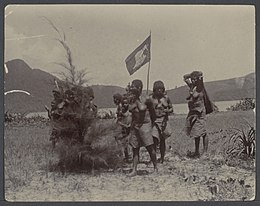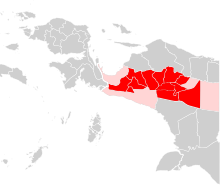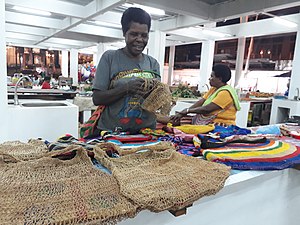 Noken bags | |
| Type | Knotted or woven bag |
|---|---|
| Place of origin | Western New Guinea, Indonesia |
| Noken multifunctional knotted or woven bag, handcraft of the people of Papua | |
|---|---|
| Country | Indonesia |
| Criteria | Knowledge and practices concerning nature and the universe, Oral traditions and expressions, Performing arts, Social practices, rituals and festive events, and Traditional craftsmanship |
| Reference | 00619 |
| Region | Asia and the Pacific |
| Inscription history | |
| Inscription | 2012 (7th session) |
| List | Need of Urgent Safeguarding |

Noken (from Biak: inoken) is a traditional Papuan multifunctional knotted or woven bag native to the Western New Guinea region, Indonesia. Its distinctive usage, which involves being hung from the head, is traditionally used to carry various goods, and also children.
Cultural significance
[edit]In 2012, noken was listed in the UNESCO Intangible Cultural Heritage Lists as a cultural heritage of Indonesia.[1] Women carrying noken are still a common sight in Wamena.[2]
On December 4, 2020, Google celebrated noken with a Google Doodle.[3]
Usage in politics
[edit]
Red: practiced the noken system for the 2019 elections. Pink: used to practice the noken system, but not for the 2019 elections
In several areas of Central Papua and Highland Papua, noken – instead of the usual ballot box – is preferred as a way to place ballots, where it is recognized as a ballot tool and system where a big man (primarily chieftains) cast votes for the tribe or noken gantung, where the tribe members and the chief collectively decide to vote unanimously in the regional leadership elections.[4][5] Opponents to the system has challenged the use of noken as fraught with potential for abuse and have challenged it in the Constitutional Court of Indonesia. The court defended the limited use of noken for avoiding inter-tribal warfare, but ruled that regencies that have used one man, one vote system cannot return to noken system.[6]
For the 2024 election, twelve regencies in Central and Highland Papua used the noken system to some extent, and seven of the twelve regencies used the noken system in all polling stations.[7]
Gallery
[edit]- Selling and Making Noken
See also
[edit]References
[edit]- ^ ""Noken multifunctional knotted or woven bag, handcraft of the people of Papua", Inscribed in 2012 (7.COM) on the List of Intangible Cultural Heritage in Need of Urgent Safeguarding". UNESCO. Retrieved 10 October 2014.
- ^ Nethy Dharma Somba (26 September 2011). "Transforming Wamena into Papua's tourism icon". The Jakarta Post. Archived from the original on 2013-05-10. Retrieved 15 March 2013.
- ^ "Celebrating Noken Papua". Google. 4 December 2020.
- ^ Nethy Dharma Somba (5 February 2009). "Papuans in remote areas prefer 'noken' to ballot box". The Jakarta Post. Retrieved 15 March 2013.
- ^ Andi Hajramurni; Nethy Dharma Somba (22 January 2013). "S. Sulawesi set for vote; Papua rules on 'noken'". The Jakarta Post. Retrieved 15 March 2013.
- ^ "MK Tegaskan Pemilu dengan Sistem Noken Hanya Digunakan secara Terbatas". Mahkamah Konstitusi Republik Indonesia. 11 March 2015. Retrieved 12 October 2022.
- ^ "11 Kabupaten di Papua Tengah dan Pegunungan Pakai Sistem Noken pada Pemilu 2024". KOMPAS.com (in Indonesian). 13 February 2024. Retrieved 7 May 2024.
















